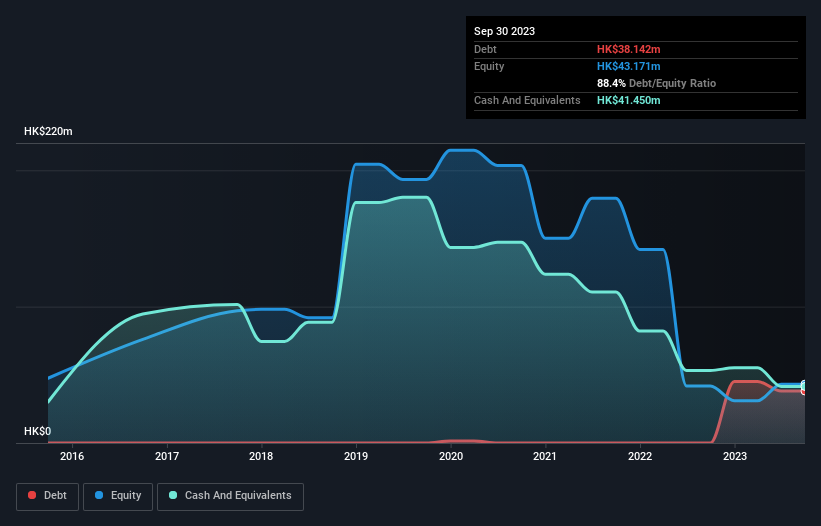- Hong Kong
- /
- Construction
- /
- SEHK:1741
Health Check: How Prudently Does Ri Ying Holdings (HKG:1741) Use Debt?

Warren Buffett famously said, 'Volatility is far from synonymous with risk.' So it might be obvious that you need to consider debt, when you think about how risky any given stock is, because too much debt can sink a company. Importantly, Ri Ying Holdings Limited (HKG:1741) does carry debt. But is this debt a concern to shareholders?
Why Does Debt Bring Risk?
Debt and other liabilities become risky for a business when it cannot easily fulfill those obligations, either with free cash flow or by raising capital at an attractive price. Ultimately, if the company can't fulfill its legal obligations to repay debt, shareholders could walk away with nothing. However, a more usual (but still expensive) situation is where a company must dilute shareholders at a cheap share price simply to get debt under control. Of course, debt can be an important tool in businesses, particularly capital heavy businesses. When we think about a company's use of debt, we first look at cash and debt together.
View our latest analysis for Ri Ying Holdings
What Is Ri Ying Holdings's Debt?
As you can see below, at the end of September 2023, Ri Ying Holdings had HK$38.1m of debt, up from none a year ago. Click the image for more detail. However, it does have HK$41.5m in cash offsetting this, leading to net cash of HK$3.31m.

How Healthy Is Ri Ying Holdings' Balance Sheet?
Zooming in on the latest balance sheet data, we can see that Ri Ying Holdings had liabilities of HK$152.2m due within 12 months and liabilities of HK$6.44m due beyond that. Offsetting this, it had HK$41.5m in cash and HK$134.8m in receivables that were due within 12 months. So it can boast HK$17.6m more liquid assets than total liabilities.
This surplus suggests that Ri Ying Holdings has a conservative balance sheet, and could probably eliminate its debt without much difficulty. Succinctly put, Ri Ying Holdings boasts net cash, so it's fair to say it does not have a heavy debt load! The balance sheet is clearly the area to focus on when you are analysing debt. But it is Ri Ying Holdings's earnings that will influence how the balance sheet holds up in the future. So if you're keen to discover more about its earnings, it might be worth checking out this graph of its long term earnings trend.
In the last year Ri Ying Holdings wasn't profitable at an EBIT level, but managed to grow its revenue by 105%, to HK$226m. So there's no doubt that shareholders are cheering for growth
So How Risky Is Ri Ying Holdings?
Statistically speaking companies that lose money are riskier than those that make money. And the fact is that over the last twelve months Ri Ying Holdings lost money at the earnings before interest and tax (EBIT) line. And over the same period it saw negative free cash outflow of HK$42m and booked a HK$1.8m accounting loss. With only HK$3.31m on the balance sheet, it would appear that its going to need to raise capital again soon. Importantly, Ri Ying Holdings's revenue growth is hot to trot. High growth pre-profit companies may well be risky, but they can also offer great rewards. There's no doubt that we learn most about debt from the balance sheet. But ultimately, every company can contain risks that exist outside of the balance sheet. For example, we've discovered 4 warning signs for Ri Ying Holdings (2 are potentially serious!) that you should be aware of before investing here.
If, after all that, you're more interested in a fast growing company with a rock-solid balance sheet, then check out our list of net cash growth stocks without delay.
New: Manage All Your Stock Portfolios in One Place
We've created the ultimate portfolio companion for stock investors, and it's free.
• Connect an unlimited number of Portfolios and see your total in one currency
• Be alerted to new Warning Signs or Risks via email or mobile
• Track the Fair Value of your stocks
Have feedback on this article? Concerned about the content? Get in touch with us directly. Alternatively, email editorial-team (at) simplywallst.com.
This article by Simply Wall St is general in nature. We provide commentary based on historical data and analyst forecasts only using an unbiased methodology and our articles are not intended to be financial advice. It does not constitute a recommendation to buy or sell any stock, and does not take account of your objectives, or your financial situation. We aim to bring you long-term focused analysis driven by fundamental data. Note that our analysis may not factor in the latest price-sensitive company announcements or qualitative material. Simply Wall St has no position in any stocks mentioned.
About SEHK:1741
Shing Chi Holdings
An investment holding company, operates as a construction contractor in Hong Kong.
Flawless balance sheet low.
Market Insights
Community Narratives



